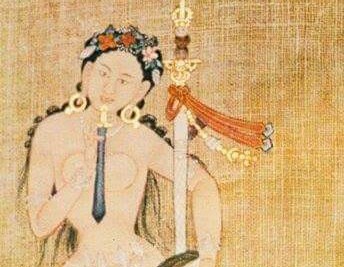Gesar, King of Ling, sees himself wandering at Sarnath in the gathering darkness of late evening. A young girl appears from the dark and gives him a text. He cannot read it because then the Queen of Night encompasses him. Emerging from every shining pore of the Queen of Night’s velvet body, Gesar sees all the sentient beings, gods, demigods, humans, animals, ghosts, hell-beings with all their varying capabilities and interests in all their disparate abodes. Some are joyful, others suffer unspeakably. Amongst them, he sees innumerable beings trying to dispel the ignorance and relieve the suffering of those around them. They are like the immeasurable flickers of light rising and falling on a vast torrential night sea.
![]()
THE RAZOR OF PRAJNA: CALLING ON THE ALL-PERVASIVE SARVABUDDHADAKINI,
THE FEARLESS AND RADIANT ONES, MAHAYOGINIS MEKHALA AND KANAKHALA
Appearing in her unassimilable display,
Appearing without thought in form after form,
She dances the endless winds of mind-made karma
That pour through the empty chambers of the heart,
Tearing apart the heart of form and giving birth.
Homage to her who is the offering,
The offerer, and the object of the offering;
The sacrifice, the sacrificer, the object of the sacrifice.
One in the vast emptiness of the guru’s mind.
Mekhala and Kanakhala were sisters born to a householder in Maharastra. Mekhala was two years older than Kanakhala. Their father felt fortunate to betroth them in their childhood to the two sons of a wealthy merchant, and years later was beside himself with pleasure when the marriages finally took place. Though both the merchant’s sons were, to all appearances, entirely respectable, in fact the elder one was perversely dissolute while the younger one was cold and cared only for business. Mekhala, for her husband’s amusement, was forced to subject herself to the sexual usage of his friends; while Kankhala was neglected and continually criticized by her husband’s family for failing to please him. Mekhala found herself being secretly debased into something with less self-respect than a slave. While Kanakhala found herself becoming a wraithlike demoness, consumed by resentment and bitterness.
When they sat together, recalling their childhood, so filled with delight, excitement, and curiosity, they could not understand why they were now so tortured and their life so painful and unrecognizable. Their sorrow was all the greater since their own family would not listen and would not permit them to return home. “Is there a bridge that can cross over this wasteland of evils and suffering? Is there any way we can change our lot in this world?” they often wondered as they sat together on a balcony which overlooked the busy street on which their husbands’ shop was situated.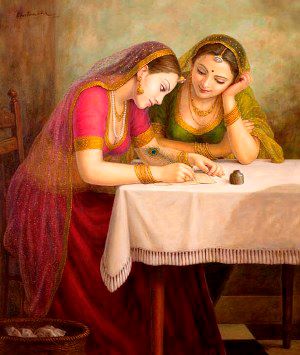
And often they talked of running away to another country. But, as two lone women, they knew they would be treated just as badly wherever they went. They could see no possible escape. As they were conversing in this way one evening, it happened that the great guru, Kanha was passing by in the street below. Kanha was unshaven and very dark. His eyes were bloodshot, his gaze steady and imperious. As he walked proudly through the street surrounded by seven hundred male and female disciples, seven yellow silk canopies floated in the air above his head, and seven hand drums hovered and played in the air around him.
The sisters were filled with awe. They decided at once that they should seek out Kanha and ask him for the way to alleviate their suffering. When Kanha received them, they said: “We live in terror of this world of continuous and inescapable pain. Please show us the path which can liberate us from the iron net in which we are enmeshed by causes we do not know.” Thus they begged the great guru. Seeing the intensity of their revulsion and longing, he empowered them with the sadhana of Vajravarahi and the instructions on the complete integration of inseparable view, meditation, action and result. He sent them off to practice in solitude in the forest, and they did so for twelve years. Though their husbands, family and friends searched everywhere they could think of, they could not find them. All those who had known them were sure that they had died.
Through one pointed devotion and practice, the sisters received the blessings of Vajravarahi. Both sisters attained the powers of pacifying, enriching, magnetizing and destroying. They mastered the outward gazes whereby the world is transformed along with all other mundane siddhis. They were no longer impeded by mountains, walls or water, nor did they experience the sorrow of any inner impediments. Without deviating for an instant from their vows, they practiced continuously.
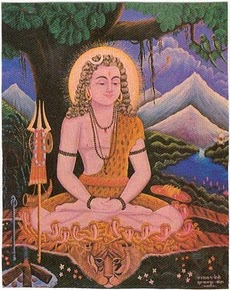
One day as they were walking near their hermitage, they encountered followers of the Mahasiddha Goraksa who challenged them: “If you are students of the great Kanha, then show us some miracle.”
It happened that these yogins all lived in an especially lovely place. So the girls, unwilling to hear their guru disparaged, performed the gaze called, “that which moves forth”. They looked in the direction of these yogins’ retreat and moved their dwellings to a white ashy desert which was neither beautiful nor pleasant. The sisters then said to the yogins: “Now you must honor your guru by restoring your retreat place.” This they could not do. Later, only when Goraksa himself asked the sisters to forgive his disciples, they restored the houses to their former locale.
After some time, both sisters felt a longing to see Kanha once again, and went off in search of him. They found him in Hemadala in Eastern Bengal where he had gone to bring the King, Lalitacandra to the path of dharma. The great teacher sat amid thousands of his disciples, and spent his days teaching and performing feast offerings in the eight charnel grounds which surrounded that city. Pressing through the throng surrounding Kanha, the sisters called out to him, prostrated, and made mandala offerings. The great guru smiled and spoke kindly but did not recognize them. The sisters were no longer the young wives of wealthy men but now resembled wild dark forest creatures. He asked them who they were.
Mekhala and Kanakhala were shocked that their guru did not know them. After all they had spent years and years practicing and living according to his instructions. They did not know what to think. Their minds went blank, and they were struck dumb. In that same moment, they recognized that the powers they had attained in practice were merely worldly attainments. Such achievements were relative and impermanent. Then as if looking at a cosmic snare, they saw the unending intricacy of cause and effect that is mind itself. Their beings were flooded by light without origin.
Mekhala sang this song:
Beyond attachment, all inner and outer phenomena
Are mind and have one taste.
In the supreme meditation without effort or striving,
Perfect Buddhahood radiates pure non-dual bliss.
Kanakhala sang this:
Wearing impenetrable armor of patience,
Crowned with vajra endurance,
In my own mind, I set forth.
Now I leap from the human corpse.
The Mahacarya replied: “That being so, certainly you should have brought me an offering” And the sisters told him: ” Now, by the grace of the guru, we two have attained our goal, we wish only to dissolve into the sky. We will be pleased to offer whatever the guru requests.” The Mahacarya replied: ” Well then, cut off your heads, and give them to me”
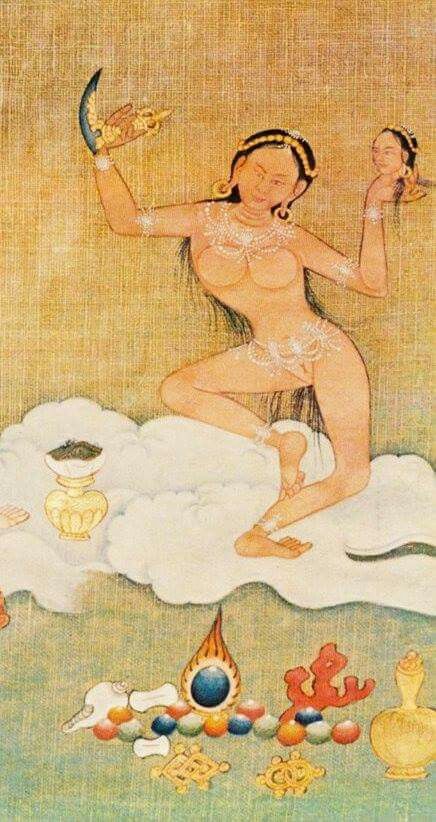
So, without intention or self-conscious drama, the meeting of guru and disciple proceeded in the unfolding of Buddha-mind itself. From their mouths, the sisters each drew out the diamond sword of prajna. Mekhala and Kanakhala, held the blazing swords which had sprung from their mouths like tongues of flame aloft in their right hands and swirled them in the air. The sound was harsh and terrifying like the roar of an approaching tornado.
Then the sisters sang:
Listen,
The melody of the sword of prajna
Calls forth time in
The appearance of reality;
So filled with subtle meanings, questions, promptings,
Worlds radiate in the unceasing movement of sound.
Opening and closing
The shape of the world and the experience of beings
Expands and contracts.
Life begins, remains, echoes, and decays.
Sound in its coloration,
As blue, yellow, scarlet, green;
Shimmers as the mandala of existence,
Solidifies in waves of words as ground of being:
As anger, pride, lust, and envy, fear;
As the demarcation of what is called life
And what is called death
Spins unceasingly, pressing on
As the dim welter of conflicting emotion.
It is said:
Just as a moment has an end,
So it must have a beginning and a middle.’
So, from the naming of one moment,
The infinite mirage of time appears:
The mirage of beginning, of maintaining, of destruction and of void.
At a word or phrase
The senses expand, contract:
As space and solidity
Where beings seek to dwell.
Worlds take form.
Those who live there live in time,
Struggle to give birth, to continue, to die.
So illusory dramas of life and death are strategized and played
As beings seek refuge in endless realms,
Bound together inextricably
By concept and word.
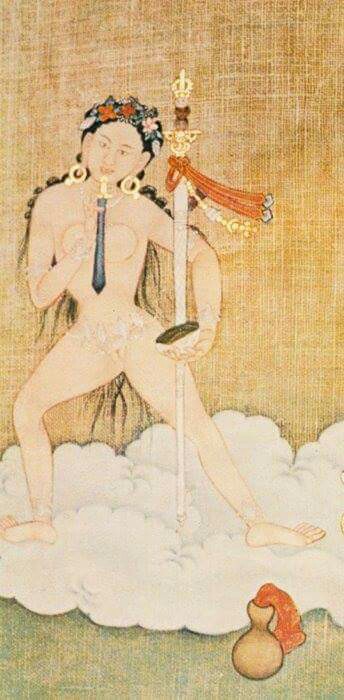
Then as suddenly as a flash of lightning cuts through a mass of black thunder-clouds, the sisters slashed through their necks completely. And although they severed head from body, their heads remained poised upon their necks.
In utter simplicity
As the stainless and unfabricated sword of prajna
Moves like a great wind
Through the all unstable certitudes of thought and emotionality
Which beings try to make their home,
All complex logics
Collapse.
All struggles
Dissolve.
Cut through all intentions of beginning, or speculation about origins,
Of needing to initiate anything or for anything to be or have been initiated.
Cut anxiousness.
Cut causality away.
Cut through all ideas of and strategies for preserving, maintaining, or continuing,
Of needing to preserve anything or for it to be preserved.
Cut emotionality.
Cut hope away.
Cut through all thoughts of loss, of death, or annihilation,
Of needing to extinguish anything or for it to be finished.
Cut moodiness.
Cut fear away.
Cut through all ideas about emptiness or void
And any bias towards non-existence as truth or a place of refuge.
There is nothing to rely on in concepts.
The profound simplicity of the guru’s speech is the only guide.
Because this is the unending mandala of the battlefield
Which teems with crude and subtle enemies,
Cut again and again and again and again
As long as there is any thought or emotional conflict.
This is not discipline.
This is the sound and movement of naked prajna itself.
Do not lose heart.
Where the diamond sword had passed through each yogini’s neck, only a line of blood the width of a hair, glowing like a blacksmith’s fire, and filling the air with the red light of dawn marked its passage. Those who saw this were utterly dumbfounded. The sisters sang:
There is no logic nor absence of logic,
No word nor absence of word
Nor existence nor non-existence.
Inexpressible,
Real without the opposition of unreality.
Moving without intention,
Free from obstruction,
Prajna is ceaseless.
Complexity is severed at the root.
This is the guru’s spontaneous presence
Appearing from the continuity of prajna itself,
This is the empowerment of the damaru
From which all outer and inner phenomena emerge
As the vowels and consonants,
And of the kapala, the limitless natural container of all,
The ground of the deathless primordial union of guru and disciple.
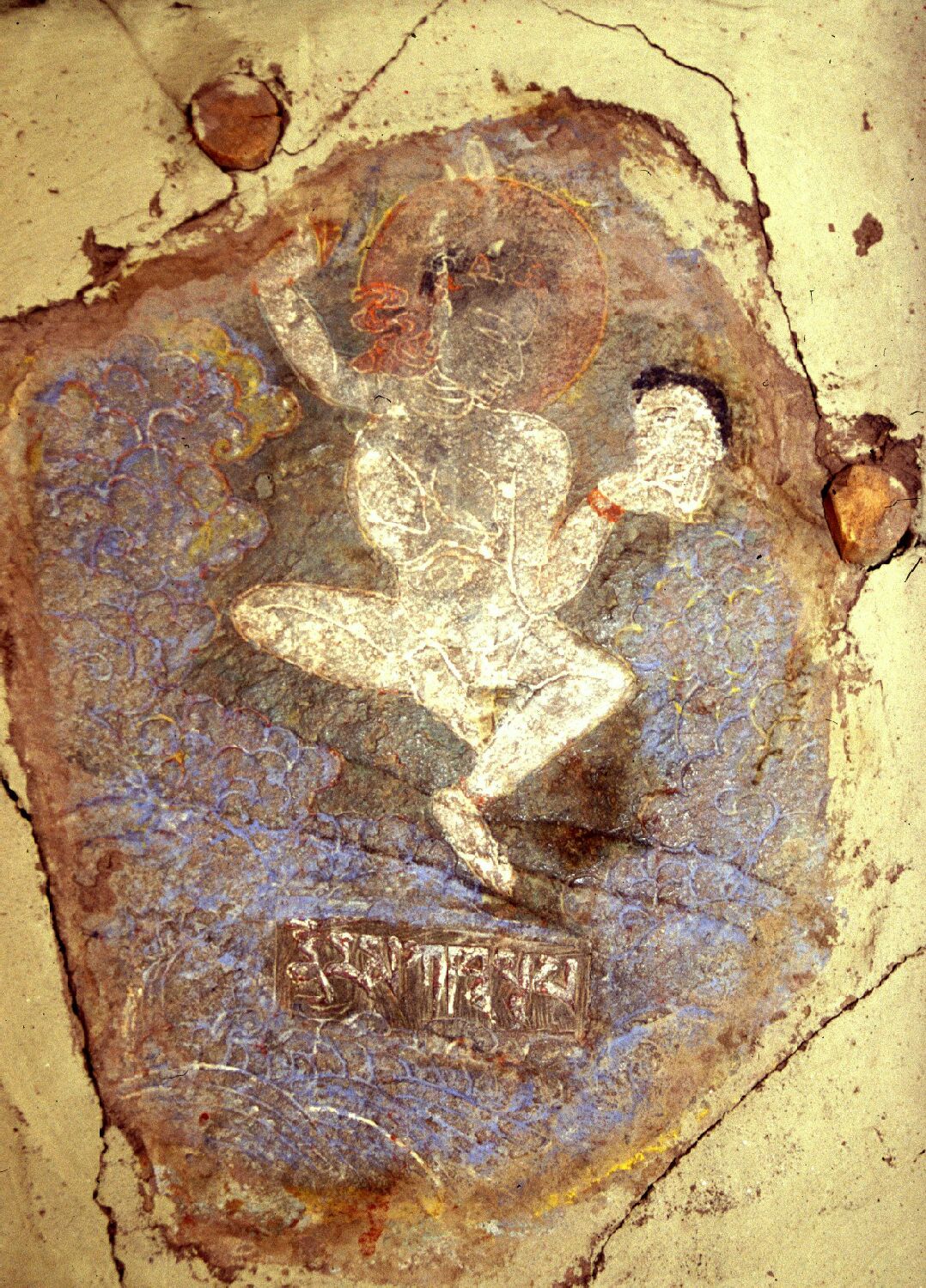
From the two veins in the yoginis’ necks, streams of red and white bodhicitta spurted out, curving through the air and, touching the outstretched tongues of the severed heads, poured in an unending stream into their gaping mouths.
Cutting off all appearance of duality:
Wisdom and ignorance, form and emptiness,
Prajna, at one stroke,
Severs and reveals the life-essence of duality:
The stream of co-emergence,
The red and white elements of mother and father.
Inseparable from them,
Prajna is the melting fire of union.
Revealing and revealed by this union,
Prajna is the source of all.
The sustenance of all.
One taste.
Two I am one.
One I am two.
They offered their severed heads with bloodshot eyes glaring madly and black hair swirling upwards to the Great Guru. Kanha laughed and touched the forehead of each as a sign of his acceptance, as their song continued.
Because there is no confirmation by any union,
I, Prajna am the consort.
I, Prajna am the lover and the end,
I am the embrace,
The final illusion called other.
I am the mind which moves
Without finding a place to dwell,
Without being a stable subject from which to project
Or experience any illusion.
And I am the creation of that mind.
I am the sought unfound,
The unfulfilled desired,
The never known.
I am the sacrifice of all that lives
Within the limits of life, death, desire and form
Moving always beyond all limit.
I am the origin and sustenance and end of all
Which moves and dwells within such limits.
And I am the sacrifice for all that lives.
I am the essence and heart,
Pouring out,
Sustaining, but not coursing in the limits
Of any form or body.
A deep turquoise light, the color of an autumn morning sky, emanated from their hearts and suffused all the air, while the sisters themselves seemed to flicker like a raging fire. The minds of all others who saw this were utterly paralyzed. The sight was unbearable, yet they could not take their eyes away.
Exhilaration
Terror
I am the intensity of movement and presence.
There is no solidification by desire or concept.
Consumed in movement,
Filling all of space,
I am the absolute source and void.
Delirium filling all of space,
I am the intoxication of the thousand worlds.
Although there was complete silence, for those, immersed in blue light, staring at the fiery display, it seemed as if a deep melodious song pierced their marrow.
Melting in my embrace,
This is the empowerment of Prajna-jnana,
The inseparability of ground and path:
Movement devoid of concept and emotional bias
Movement inseparable with motionless space.
The indissoluble union of mind and guru,
I am mind, pure without limit,
Without even the limit of a notion of mind.
Freed from any goal
Anger is insight not limited by knowing;
Pride is equanimity not limited by ownership;
Lust is love not limited by confirmation;
Envy is completion not limited by completeness.
I am the living pathway to the vajra world.
Since nothing is ever separable from me,
There is no end.
I am the heart.
Then the sisters Mehkala and Kanakhala, dancing backwards rose together into the sky on a bridge of light. As they rose, lights of every color radiated from their bodies, and the brilliance was such that it made all the sky and earth seem dark.
Phenomena and space,
Relative and absolute truth,
Prajna and compassion,
The mandala of existence
And dharmadhatu itself
Are one in the boundary-less expanse of Kanha’s stainless mind.
Free from any reference point whatsoever,
Unlimited action, ceaseless love,
Utterly unmoving,
Kanha is all the kayas in one being.
Surrendering into this,
Is not meditation.
Surrendering completely
Is the supreme prajna.
Ignorance and awareness,
Bondage and freedom are one.
Prajna is the all-pervasive light of phenomena,
The essence of space,
And space itself.
From the non-dual union of space and awareness,
The unborn bindu of blazing luminosity
Illuminates totality.
In shadowless complete surrender,
This is the vajra dance.
AH
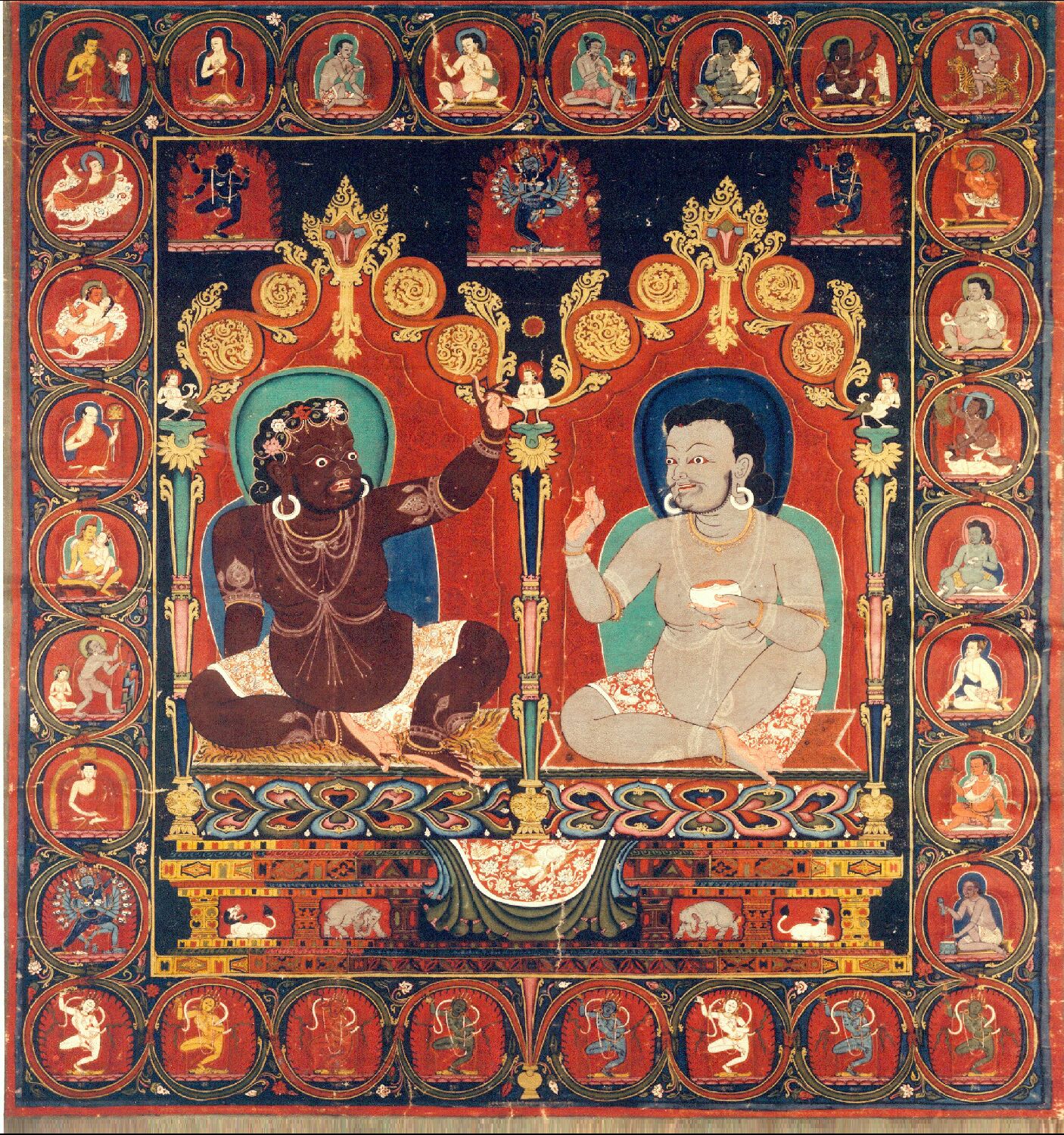
Then the great lord, the Mahacarya Kanha, stretched forth his right arm which extended effortlessly up into the center of space like a ray of light. Taking the head of each in turn, he replaced it on the body so that no scar or mark remained. He took both in his hand and brought them to earth. He smiled at them and they went about their way.
To a melody like laughter, Kanha sang this song:
Seeing it, it cannot be assimilated.
Remembering it, it cannot be known.
Thinking of it, no meaning can be found.
Describing it compounds uncertainty and misunderstanding.
Forgetting it, one is still haunted.
Thus it cannot be opposed.
In this manner, with the complete and self-existing dedication of merit, the great lord Kanha sealed the display of the All-Awakened One, The Sarva Buddha Dakini who is Vajrayogini and Prajnaparamita in person, the self-existing Dharmacakra.
SARVA SVABHAVA PRAJNA MANGALAM SVAHA
This was extracted from The Brilliance of Naked Mind: Secret Visions of Gesar, King of Ling with the kind permission of the author Douglas J. Penick.
Painting of Mekhala and Kanakhala is unknown.
More about the painting of Virupa and Kanha. Mural painting, from Himalayan Art. Painting of Goraknath.
